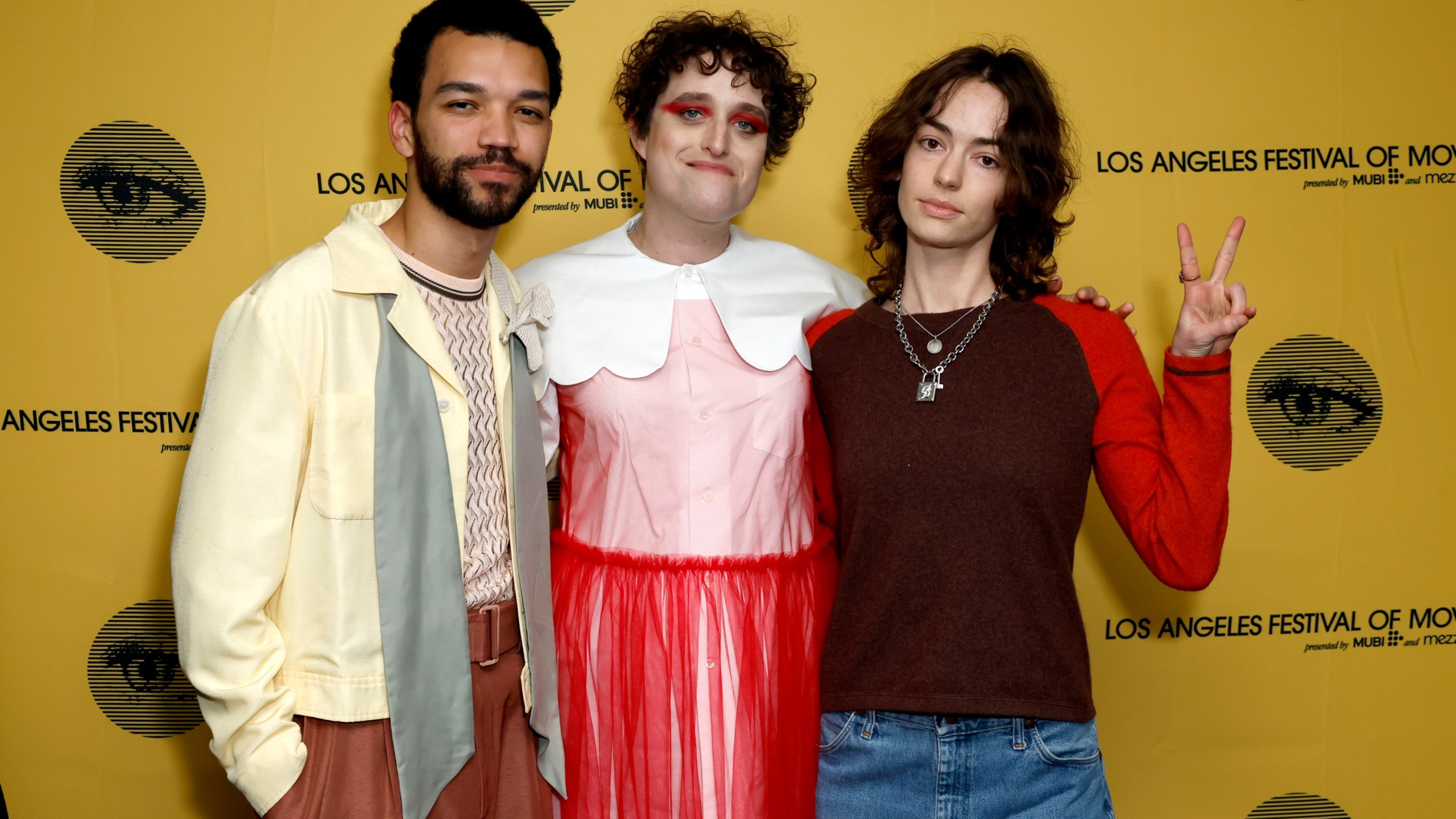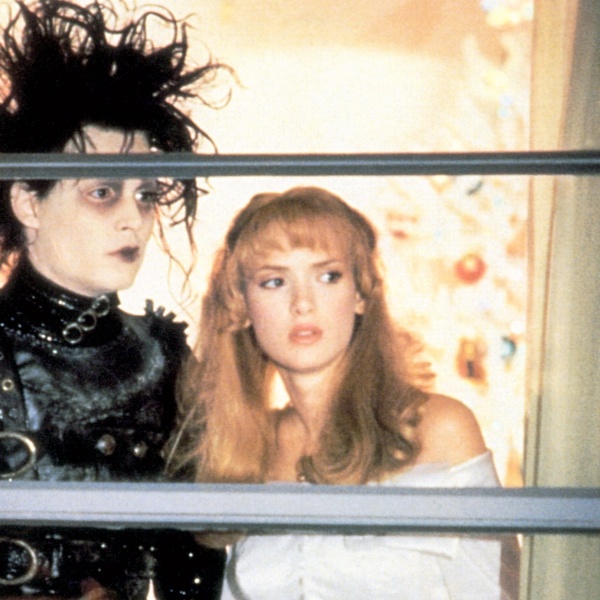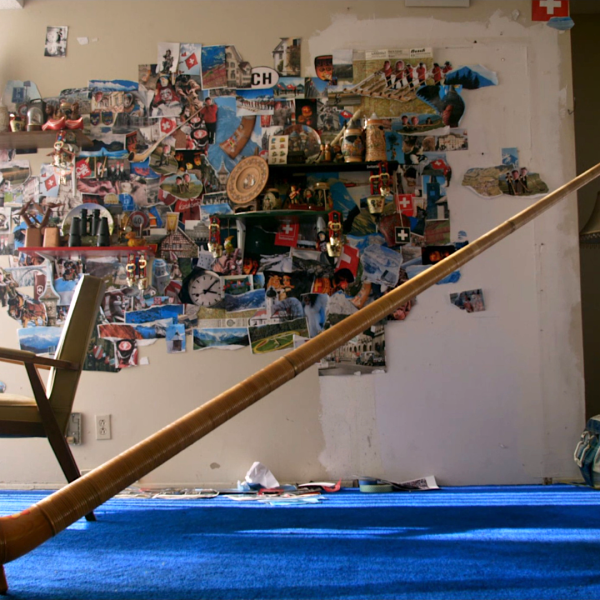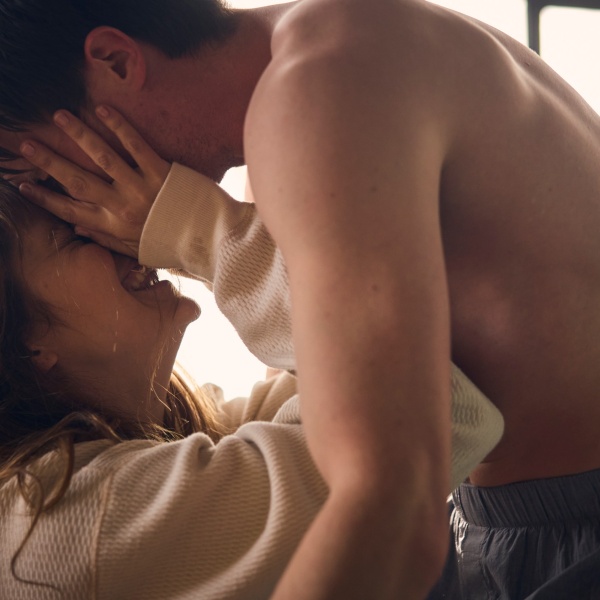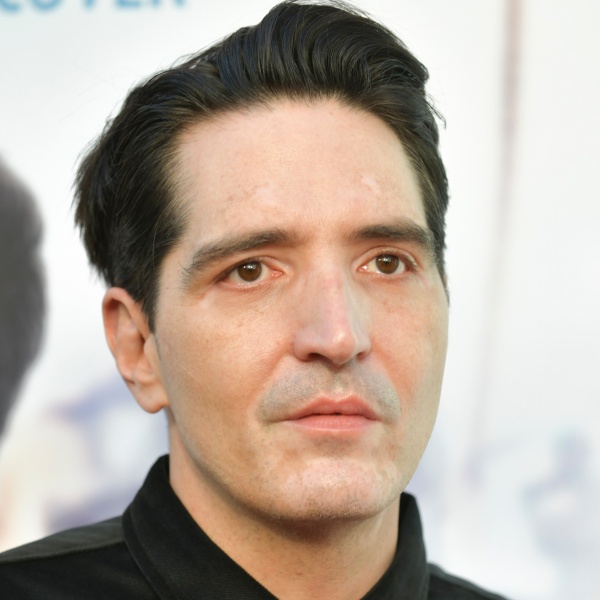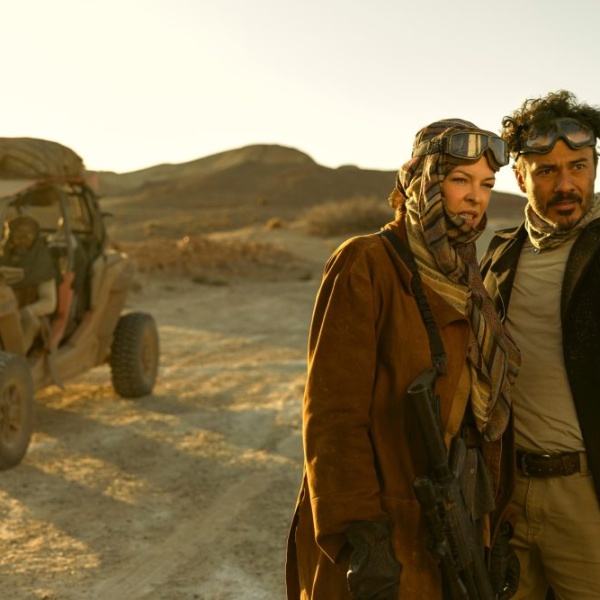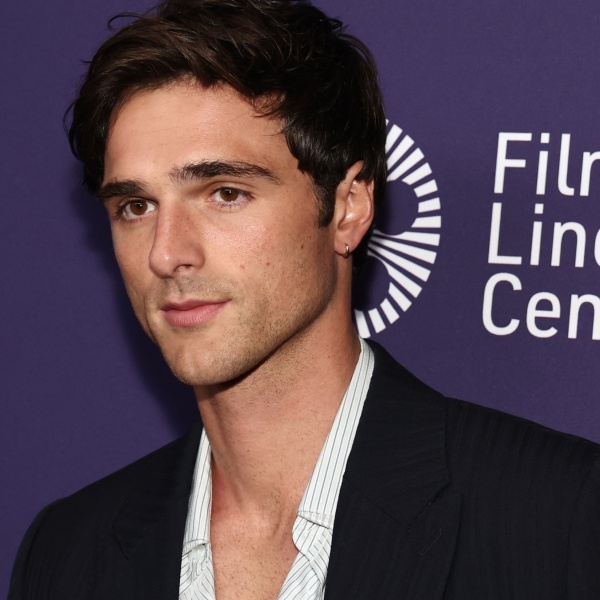Brigette Lundy-Paine still remembers what it felt like the first time they read Jane Schoenbrun’s script for “I Saw the TV Glow.”
“I felt very excited by it because it was unlike anything that I had read before,” the actor told IndieWire during a recent interview. “It felt like a mystery, it felt like the beginning of a great season of discovery. It just affected me the way that watching the movie now does, it leaves you with a flash of color and light and a deep, unsettling feeling. And that was all in the script.”
The film, Schoenbrun’s sophomore feature, follows a pair of disaffected suburban teens — Lundy-Paine as Maddy, Justice Smith as Owen — who bond over a young adult TV series called “The Pink Opaque.” The A24 feature, which was a hit at Sundance when it premiered at the festival this January, follows the pair through distinct periods of their lives, impacted both by each other and the lingering power of the TV show they both worship. But, as is the case with Schoenbrun’s work, there’s so much more to it, and Lundy-Paine knew that from the second they read the script.
Talking about it is a bit harder. Lundy-Paine admits they don’t necessarily like doing press, but as we settled into the library (like a giant Criterion Closet, plus expansive conference table and two — only two — comfy chairs) at A24’s midtown Manhattan office last month, they added, “But it’s way better to have someone to talk to in person. So nice.”
Connection is at the heart of Schoenbrun’s film. Maddy and Owen are both plagued by feelings of not belonging, in their families, their schools, their societies, their own bodies. Their friendship — and the TV show, which follows a pair of teen girls who are psychically connected and use their bond to fight a terrifying entity known as Mr. Melancholy — helps, sort of. It’s hard to imagine how a rising performer like Lundy-Paine, best known for their work on the Netflix series “Atypical” and the long-awaited sequel “Bill & Ted Face the Music,” could even go about finding such a project.
“I’ve always been a bit unsure how to look for stuff because I get sent a lot of scripts by my agent, but at the time, I kind of stopped getting sent stuff, I think because people didn’t really know what I was or what I wanted to do,” they said. “I was just looking for something that was really smart.”

Lundy-Paine watched Schoenbrun’s first feature, “We’re All Going to the World’s Fair,” in advance of their first meeting and in fitting style: alone, on their laptop. Schoenbrun’s auspicious debut, which premiered at the 2021 Sundance Film Festival, explores both internet culture and personal disaffection through a chilling coming-of-age story about Casey (Anna Cobb) as she navigates her way through an online role-playing game. As with “I Saw the TV Glow,” basic plot descriptions can’t quite do it justice.
“I felt like this is a completely new way to do horror,” Lundy-Paine said. “This is a fear I didn’t know a movie could make me have, which is [feeling] deeply lonely and afraid of my own illusions. And afraid of my own body in a way that isn’t like your body’s a freaking monster and it’s ripping you up, it’s like, no, it’s just the place you have to be. I think ‘I Saw the TV Glow’ is a more extreme version of that, and it brings in the element of your body is a place you can be, your body is a place that you can build yourself into, and that yourself is something that you don’t have to look for outside anymore, it’s in there.”
Lundy-Paine had recently worked with Gabriel Abrantes on his “Amelia’s Children,” and the feeling she had about Abrantes — “that I would love making a movie with him, no matter what” — was the same she had about Schoenbrun. “We just clicked immediately, and I felt so strongly about the script that it felt like destiny,” the actor said.
Schoenbrun, a non-binary filmmaker, has been very open about the film’s meaning: It is about the “egg crack,” the moment a person realizes they are trans. Lundy-Paine, who is also non-binary, always knew — and embraced — that essential reading of the film.

“I knew it when I read the script, I knew it was a story about understanding you were trans,” Lundy-Paine said. “I don’t know if we talked about it specifically, but I think because so many of our early conversations were about what it meant to be trans and what it meant to be telling stories as a trans person and the constant reduction that you have to combat, I think it was very clear what story we were telling.”
That meant that the actor was not just able, but actively encouraged, to put many of their own feelings into the role. While we first meet Maddy during her early teen years, the experiences that Lundy-Paine tapped into to play the part go beyond their own youth.
“The feelings weren’t from my childhood necessarily, so much as they’re always with me, always a feeling of isolation and strangeness, and wanting to communicate and not being able to,” they said. “Jane has been my role model in how they’ve structured a language in which to speak about themselves and their truth.”
Part of that language is films like “We’re All Going to the World’s Fair” and “I Saw the TV Glow.” Part of that is talking about those films, and more. It’s hard work, and Lundy-Paine has taken much from seeing Schoenbrun do it.
“It takes a fucking lot of work,” they said. “You have to explain yourself so many times and sell your world to so many people in order to get to the place where you break through to ultimate truth. That’s what this movie feels like […] because it’s so specific and personal, it becomes something that shoots right to everyone’s soul because we all want the same things, really.”

That’s the key to Schoenbrun’s work: their ability to take the exceedingly personal, turn it inside out with wild allegory, and emerge with a story that can’t help but engender profound personal connection. There is something for everyone in “I Saw the TV Glow,” a feeling that Lundy-Paine brought to the screen and beyond, even in the more fantastical of scenes.
“I think great allegory does that, it’s more powerful,” Lundy-Paine said. “I wove together my experiences of the urgency of needing to transition, and what Maddy goes through being buried alive, burying herself alive, and then emerging as someone who is me. It just always made a lot of sense to me. I never questioned the logic of it at all, which was funny because then when we did press at Sundance, I was still in my experience of the movie, and people were like, ‘So this is a film about media,’ and I was like, ‘No, it’s not. What are you talking about?’ But I get that now.”
The “urgency” of Lundy-Paine’s own need to transition was, understandably, a bit more top of mind for them, both while making the film and afterwards.
“I remember telling Jane early on, ‘I think I’ve already transitioned,’ and they were like, ‘OK!’” Lundy-Paine said. “Because when I started [my transition], I felt like I had a feeling of, well, people use gender-neutral pronouns for me, so I’m in this safe space, this gray area — which is, at the same time, completely not safe, because people are always asking, ‘But what are you?’ and it’s like, ‘Well, I don’t really know. I don’t know if you know what you are. I don’t think any of us are telling the full truth about something.’”
The film follows Maddy through three distinct periods in her life: high school, a few years after she disappeared before graduating, and nearly a decade after that. Maddy gets to grow and change, physically and emotionally (light spoilers here: she even tells Owen the world they live in isn’t the real one, the reality of the show is, and she’s managed to slip into and out of it), something Lundy-Paine didn’t think they were doing before their transition.
“I was definitely clear that I was not growing up, and I didn’t know why,” Lundy-Paine said. “I was suspicious because I was like, ‘I know I’m playing teenagers a lot, and that probably has something to do with it, but there’s something that’s like, I’m just not able to move forward.’ Doing the film, I knew I had to use it as this super-slide to get through. I told Jane that I wanted to start hormones before we started shooting, and asked if that would be OK, and they were like, ‘Of course,’ but I actually didn’t have the courage to until much later, until after we stopped shooting, maybe six months afterwards.”
These days? Oh, it’s an adventure. The movie helped.
“Every day is a different experience of what I think I’m becoming because it’s puberty, and it’s really emotional,” they said. “It’s super-scary to change as an adult. It’s very vulnerable because it feels like I’m getting all messy again. But I know I have to do it, and I’m really grateful for the movie because it feels like a way to do it publicly that makes sense.”
As Lundy-Paine continues that journey — both on the screen and off — they are energized about what comes next, or at least the possibilities of what might come as they dig deeper into their own self. Work-wise, they’re a font of ideas, a mash-up of all the stuff they’re enjoying these days.
“I would love to do a New York movie,” they said. “I really love Peter Falk. I started watching ‘Columbo’ again recently. I’d definitely love to play a detective, not to do copaganda, but I would love to play a detective. I want to do a ‘Mikey and Nicky’ type movie, just a fast-talking movie, a funny movie.”
They also run a magazine called Waif, and they’re working on a variety show off-shoot of it (“WaifTV,” of course). They’re working on lots of stuff with their close friend, the actor Alex McVicker, including an improvised film called “October Crow” they are scoring now (Lundy-Paine’s own mom also appears in the film as “a terrifying woman, she’s a really Catholic woman”). Lundy-Paine said they and McVicker are also planning to write a new feature called “The Jalapeno Pauper,” which will be “about a street performer, he discovers elegance and it ruins his life.” (What a fantastic pun.)
Before we said goodbye, I asked Lundy-Paine about the film’s ending, about what they think happens to Maddy, what the rest of her story looked like. They didn’t hesitate. “I think she goes back into the show, I think she buries herself,” Lundy-Paine said. “She just goes back in because I think she can’t stay there. She has to go home.”
A24 releases “I Saw the TV Glow” in theaters on Friday, May 3.
